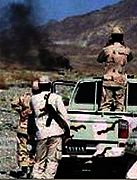Revenge on Saudi Arabia and Bahrain in Baluchistan
» Unrest in Baluchistan Explained by Scholar
The unrest in the town of Rask in Iran’s southeastern province of Sistan and Baluchistan in the last few days has left one dead and a number of injured. News sources have attributed this violence to demonstrations of residents against the arrest of Abdolghaffar Naghshbandi which took place in front of government and police offices. Abdolghaffar is the son of Rask town’s Friday prayer leader who was arrested a few weeks earlier.
The unrest follows the dismissal of the Revolutionary Guards commander of the province and the arrest of clerics and residents which have taken place over the past few weeks.
Abdolsattar Dooshoki, the head of the Baluchistan Studies Center (Markaze Motaleat Baluchistan), spoke with Rooz about the replacement of senior military authorities in the province, the recent tensions between the Islamic republic and Saudi Arabia and Bahrain and the request by the more extremist elements in the province to enforce more restrictions on Sunnis in Iran as a response to the crackdown of Shiites by Bahraini authorities.
Roots of the Recent Clashes in Rask
According to sunnionline, the official news site of the Sunni community in Iran, following the arrest of Abdolghaffar Naghshbandi, the son Rask’s Friday prayer leader, people gathered in protest in front of the military and security agencies in the town which resulted in clashes leading to the death of one person and two the injury of two others. Abdolghaffar Naghshbandi was arrested as he arrived in the city from Zahedan.
About three weeks ago, Fathi Mohammad Naghshbandi, the Friday prayer leader of Rask town was arrested along with Molana Abdullah, the Friday prayer leader of Parood, along with 13 others.
News sources in Baluchistan told Rooz that conditions in the town of Sarbaz were tense after a cleric close to the regime was killed. The arrests that followed were related to the killing of the cleric who were accused of having a hand in the assassination.
Mostafa Jangizehi, the government appointed cleric of Rask in the province of Baluchistan, was assassinated on January 19 earlier this year by unknown armed men. He had been the target of an earlier failed assassination attempt.
He was also the commander of an ethnic group Basij force and had on many occasions claimed to be pleased if he was martyred for the Islamic revolution.
Raja news had earlier announced that Jangizehi had been threatened to death by Jondollah, the armed group that has taken responsibility for many attacks in the region and whose leader was captured and executed last year. It claims to fight for the defense of the Sunni population in Baluchistan. The group is viewed as a terrorist organization by Iran and the United States.
Dooshoki, the head of the Baluchi think tank said, “Jangizehi had been among the few clerics who viewed himself as a solder of the Imam. He was the commander of a regional ethnic group. Even though Jondollah has declared responsibility for the killing, government authorities have used the incident to arrest other clerics.” Dooshoki added that anti Sunni violent sites affiliated to the government’s security forces such as Zahedan Press have been spreading propaganda against the Baluchis and Sunni clerics. These sites claim that clerics affiliated to the regime are assassinated by Wahabi elements, why should clerics who are critical of the regime be free.
Officials of the Islamic republic have till now not announced the arrest of Naghshbandi to be related to the demonstrations and armed clashes of last Monday when one person was killed. According to Dooshoki, “government agents could have arrested Naghshbandi when he was still in Zahedan, but instead chose to do it provocatively in Rask which questions their motives, particularly as tensions had been high in the region for the last three weeks.”
Baluchi activists have said that the region had been generally quiet for about 16 months after the bombings during the Tasooa commemoration day. Dooshoki adds, Apparently there are those (in the government) who want the region to return to tension and clashes, which may be why the Revolutionary Guards commander in Sistan and Baluchistan province was recently dismissed and replaced with commander Hassan Mortezavi.” He concluded that authorities made these arrests in order to get fake confessions from them to be aired as a way to control public opinion and take control of religious schools and Sunni mosques. He called such a “coup very dangerous” with unknown results.


